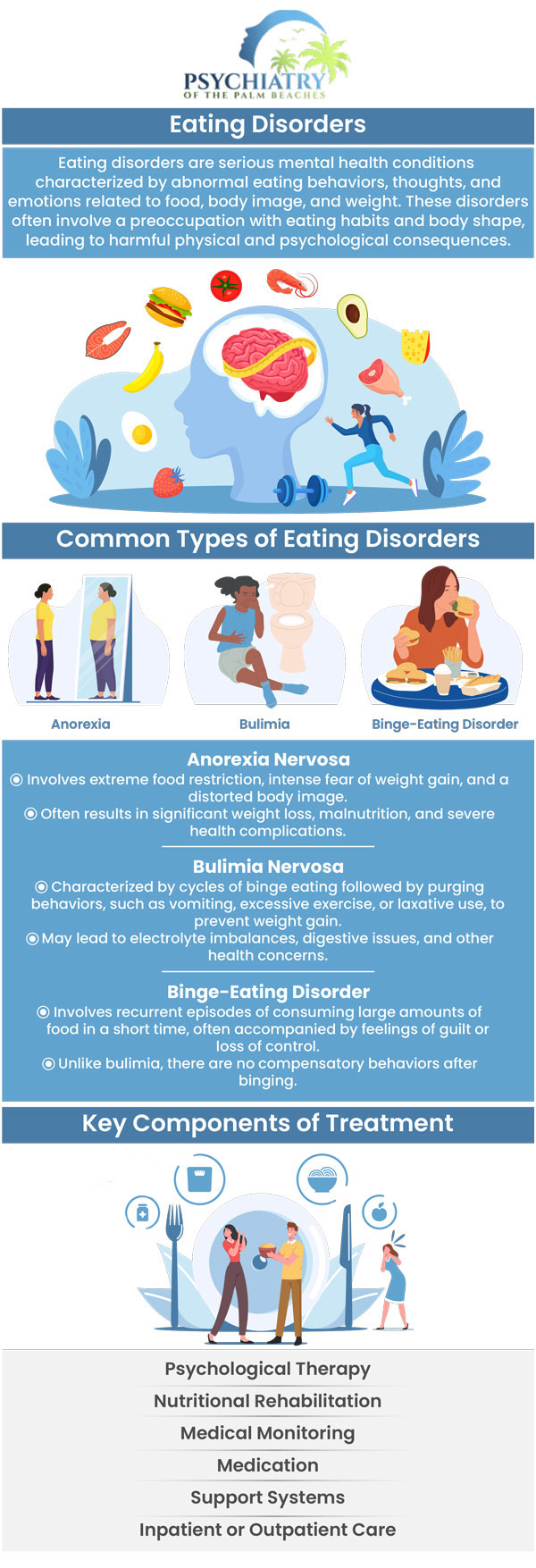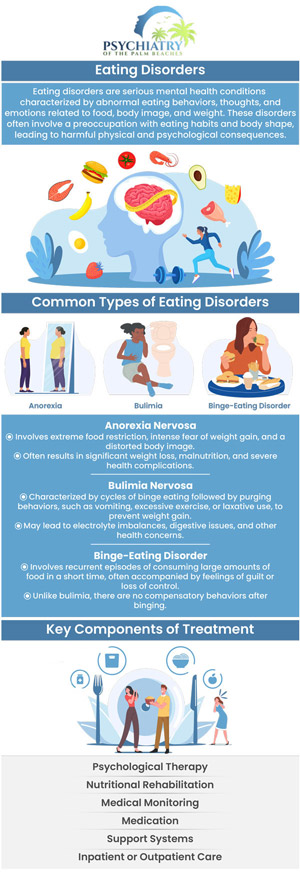Addressing Eating Disorders with Compassion
At Psychiatry of the Palm Beaches, we understand the complex nature of eating disorders. Dr. David Husted and the team offer compassionate and evidence-based treatment to help individuals recover from conditions like anorexia, bulimia, and binge eating disorder. We provide a supportive environment where you can address the underlying emotional and psychological factors contributing to your eating disorder. For more information, contact us or book an appointment online. Visit Psychiatry of the Palm Beaches serving Jacksonville, Boynton Beach, Palm Beach Gardens, Stuart, Royal Palm Beach, Port St. Lucie, Melbourne, Fort Lauderdale, and Jupiter, FL.




Table of Contents:
How are eating disorders diagnosed?
What are the health risks associated with eating disorders?
What role does family play in the recovery from eating disorders?
What are the signs of relapse in eating disorders?
At Psychiatry of the Palm Beaches, we understand that diagnosing eating disorders is a multifaceted process that requires a comprehensive evaluation including both physical and psychological assessments. This diagnostic process is crucial for initiating suitable treatment and improving patient outcomes.
The first stage in our diagnostic approach is a thorough examination of the patient’s medical and psychological background. We explore the patient’s symptoms, the duration of the disorder, and any associated medical conditions. This is supplemented by a physical examination, which includes standard tests such as heart rate, blood pressure, and temperature checks, as well as more specific examinations to identify signs of malnutrition or purging, such as abnormal heart rhythms, dry skin, or swollen salivary glands.
Our team at Psychiatry of the Palm Beaches may also order lab tests such as a complete blood count (CBC), urine analysis, and tests to check electrolyte levels, liver, kidney, and thyroid function. These tests are essential in identifying complications related to dehydration or electrolyte imbalances, which can be life-threatening if left untreated. Thyroid function tests may be executed to rule out underlying thyroid conditions that can replicate eating disorder symptoms.
A psychiatric or psychological evaluation forms a vital part of our diagnostic process. This includes discussions about the patient’s eating habits, body image, self-perception, mood, anxiety, thoughts, and behaviors related to eating. We may use self-report questionnaires to assess the presence of coexisting mental health conditions such as depression, anxiety, or obsessive-compulsive disorders.
At Psychiatry of the Palm Beaches, individuals may be diagnosed with “Other Specified Feeding or Eating Disorder” (OSFED) if they don’t fit into specific categories like anorexia nervosa, bulimia nervosa, or binge-eating disorder but still struggle with significant eating-related issues.
This comprehensive and multidisciplinary approach ensures an individualized treatment plan that addresses the specific needs and challenges faced by each patient coping with an eating disorder.
Eating disorders bring significant health risks, affecting nearly every system in the body. In anorexia nervosa, severe food restriction can lead to malnutrition, impairing critical body functions and causing extreme fatigue, weakened muscles, and a compromised immune system. The body’s lack of nutrients also reduces bone density, which may result in brittle bones and a higher risk of fractures or osteoporosis over time.
With bulimia nervosa, repeated cycles of binge eating and purging harm the digestive system, leading to serious electrolyte imbalances. These imbalances, especially low potassium, can cause dangerous heart irregularities and increase the risk of heart failure. The esophagus and stomach may suffer from constant vomiting, causing painful inflammation, sores, and, in severe cases, ruptures that require emergency care.
Binge eating disorders can contribute to obesity-related issues, such as high blood pressure, type 2 diabetes, and cardiovascular disease. Mental health complications are also common in all eating disorders, with increased risks of depression, anxiety, and feelings of isolation.
Recognizing these health risks underscores the importance of early treatment. Medical and psychological intervention can address the physical and emotional effects, offering a path toward recovery and long-term health improvement.
At Psychiatry of the Palm Beaches, we understand that family involvement plays a critical role in the recovery process from eating disorders. Their participation significantly influences the effectiveness of the treatment, the speed of recovery, and the long-term prognosis of the patient.
We encourage family members to assist in recovery by being well-informed about the nature and complexities of eating disorders. We provide resources and education to help them understand and empathize with their loved ones. They are also welcome to attend therapy sessions to learn more about the disorder, its implications, and how they can contribute to the recovery process.
We empower families to assist in monitoring their loved one’s eating habits, particularly in the early stages of recovery. They can offer practical assistance by helping with daily tasks such as meal preparation, transportation to appointments, and financial concerns. We stress the importance of doing this in a supportive and non-judgmental manner to avoid causing stress or triggering negative behaviors.
In our practice, we guide families on how to maintain a positive, recovery-oriented home environment. This includes minimizing triggers, promoting healthy eating and exercise habits, maintaining regular mealtimes, discouraging negative body talk, and facilitating open and honest communication. We also guide families in advocating for their loved one’s needs with healthcare professionals and treatment teams.
At Psychiatry of the Palm Beaches, we assist families in establishing clear boundaries to promote healthy dynamics, limit enabling behaviors, and encourage individuals to take responsibility for their recovery. We work towards empowering the person to make choices and learn from their experiences. We emphasize that recovery from an eating disorder is an ongoing process, and families can continue to provide support and guidance beyond the active phase of treatment.
Relapse in eating disorders can be challenging to recognize, often showing up in gradual changes to behaviors and attitudes around food, body image, and social interactions. Early signs may include resuming restrictive eating patterns, avoiding meals, or overexercising. Individuals might also experience an increase in anxiety, self-criticism, or obsessive thoughts regarding their appearance, leading to a renewed fixation on weight or diet.
Social withdrawal is another key sign, as the person may start to avoid gatherings, especially those involving food, or become more secretive about their eating behaviors. Physical changes, such as weight fluctuations, fatigue, or gastrointestinal issues, can signal that old habits are resurfacing. Additionally, emotional shifts like mood swings, low self-esteem, and heightened feelings of guilt or shame around food might emerge, often accompanying a decrease in self-care routines, including neglecting sleep or hygiene. Detecting these signs early on allows for intervention before a relapse progresses.
Restoring Health and Well-Being: Eating Disorder Treatment with our Providers
Our team offers a compassionate approach to treating eating disorders at Psychiatry of the Palm Beaches, guiding patients through the recovery process with care and understanding. By focusing on healing both the mind and body, our team helps individuals restore their physical health while nurturing emotional well-being and self-worth.
Reaching out for support at Psychiatry of the Palm Beaches, whether through therapy, counseling, or medication, can help reinforce healthy coping mechanisms. Regular check-ins with trusted specialists can also provide accountability, encouraging the person to stay on track with their recovery journey and helping them feel supported. For more information, contact us or book an appointment online. We have convenient locations to serve you. We serve patients from Boynton Beach FL, Delray Beach FL, Palm Beach Gardens FL, Jupiter FL, Stuart FL, Palm City FL, Royal Palm Beach FL, Wellington FL, Citrus Ridge FL, Jacksonville FL, Riverside FL, Port St. Lucie FL, Beau Rivage West FL, Melbourne FL, Palm Bay FL, Fort Lauderdale FL, Hollywood FL, Jupiter FL, North Palm Beach FL, and surrounding areas.
Check Out Our 5 Star Reviews



Additional Services You May Need
▸ Mental Wellness
▸ Relationship Coaching
▸ Depression and Mood Disorders
▸ Women’s Health
▸ Panic Disorder
▸ Medications Management
▸ Men’s Health
▸ Individual Psychotherapy
▸ Bipolar
▸ ADHD
▸ Geriatric Mental Health
▸ Couple’s Counseling
▸ Obsessive Compulsive Disorder
▸ Social Phobia Treatment
▸ Eating Disorders
▸ Post Traumatic Stress Disorder
▸ Psychotic Disorders


